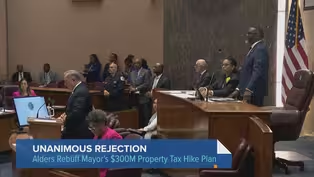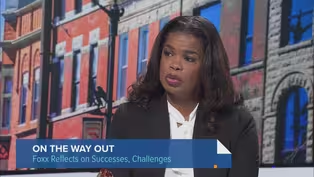Chicago Tonight: Latino Voices
Advocates Push Back Against City's New Shelter Approach
Clip: 11/14/2024 | 8m 14sVideo has Closed Captions
Chicago plans to launch the One System Initiative in January, with 6,800 shelter beds.
Chicago's plan to merge its new arrivals shelter operations with the homeless shelter network is receiving pushback from local organizations.
Problems playing video? | Closed Captioning Feedback
Problems playing video? | Closed Captioning Feedback
Chicago Tonight: Latino Voices is a local public television program presented by WTTW
Chicago Tonight: Latino Voices
Advocates Push Back Against City's New Shelter Approach
Clip: 11/14/2024 | 8m 14sVideo has Closed Captions
Chicago's plan to merge its new arrivals shelter operations with the homeless shelter network is receiving pushback from local organizations.
Problems playing video? | Closed Captioning Feedback
How to Watch Chicago Tonight: Latino Voices
Chicago Tonight: Latino Voices is available to stream on pbs.org and the free PBS App, available on iPhone, Apple TV, Android TV, Android smartphones, Amazon Fire TV, Amazon Fire Tablet, Roku, Samsung Smart TV, and Vizio.
Providing Support for PBS.org
Learn Moreabout PBS online sponsorshiporganizations are pushing back on the city's plan to merge its migrant shelter operations with its homeless shelter network.
>> The city is set to launch the plan known as the one system initiative launching January first with a total of 6800 shelter beds and the mayor's 2025 budget proposal is set to spend 21% more to fight homelessness than it did this year.
But critics claim these efforts are not enough.
Here with more on this.
Our on the day off these director of organizing at Brighton Park Neighborhood Council Action Council co-chair for the Illinois Coalition for Immigration and Refugee Rights and on the Davis aldermen of the 40's Ward and chair of the Committee on Immigrant and Refugee Rights.
We also invite the city to send a representative, but we did not hear back.
Thank you both for being here.
And I want to start with you.
What are your major concerns with the one system initiative?
>> Yeah, I think that we're we're hearing from folks.
It's like the worry and fear that there's not enough beds and it's great that we're thinking about like, how can we continue to like build these legacy shelters.
But at the end of the day, the amount of beds available for folks who have been and house in Chicago for a long time.
And like the new arrivals is not enough.
And the fear is that we're going to see more people out in the streets, families and families that are being dislocated from Mike, where they've already been building those safety networks.
>> Now is just cares that you have an input on this new initiative, a different feedback.
Once we got the news, similar the our concern was we've gone from 3,000 beds before the major mission up to about 15,000 beds for the population and support needed there.
Right now, there's 8,000.
So coming on a 6800, these about 1200 people without a place to live and what we've said time and time again is you're increasing homelessness in the city by doing so.
And that's going cost to it as well.
And so it's been pretty frustrating, watching develop, even though we had 7 beginning should have been one system and aldermen.
This is proposed spending plan for 2025.
Calls to spend 195.0 6 million homeless to services and increase.
>> From the 2024 budget are these funds sufficient think order address homelessness, any more funding, but some it's also problematic race.
And what are we doing to prepare?
The city has even prepare for extreme weather conditions during the winter.
>> And we're gonna have a lot more people need help.
So the funds are somewhat.
They're clearly we have our own financial constraints are trying to work through, but it's also what we do and how we plan things out that leave a lot of questions.
And what about the limitations?
You know, city plans to >> open the shelter for first time placement, but only for people who've been here for 30 days or less.
And there we know what is your main concern with that?
Yeah, we know what works.
And we know that if you're investing in people by offering them wrap around services, affordable housing rent assistance, then we're able to get them into like stable living conditions and we're concerned that they're like Alderman said there's not enough beds and there's people, the people out in the streets and thinking about the families and even just like individuals, we really need to stand in our morals and values right now and support the folks that are coming now are we already seeing a new arrivals actually be in tents outside their intense themselves.
You know what, in your opinion to starting groups received more prairie than others?
Will they be receiving more priority their families?
Here's a challenge.
>> The beds are already maxed out.
So go from 8,6000.
If not, there's any extra capacity.
So regardless of whether it's 30 days or they've been here born and raised in the city when they're going you know, submitted 3, 1, 1, request or whatever you get to go to the process, they're gonna find out.
All those beds are full.
Re.
So all of those things, whether we talk about rapid rehousing, right, we're investing money in that.
We have where if the beds are full and that's the problem that's never been answered.
The administration he's presenting is that they're expanding the system.
actually limiting it further.
>> Now we did have the city deputy mayor of immigrant and refugee Rights Beatrice Bolton layout on the show last month address concerns people might have about sheltering will rivals with long-term on House residence.
Let's take a listen.
>> We already have new arrivals and some homeless services shelters and those shelters to figure out the right balance but part of the one system initiative in the recommendations that came to us from providers in the working groups is to have additional training to provide, you know, bringing organizations that know how to work with different populations.
And I think that as that work continues, it will make it will build the capacity of our shelter system to do that.
>> And that what has communication between your organization in the city?
Yeah, we definitely want to see more communication and especially went before policy is implemented.
And I think that as an organization that is working directly with those new arrivals, a new neighbors, we're able to better inform the city and have case managers recommend folks like this is what our concerns are under worries are and not only that before a policy is implemented like during the implementation process and the evaluation of a policy that is impacting these folks.
>> And aldermen Vasquez will recommendations.
Would you include in the one system initiative use?
Did say you had some input.
So what would that look like with the?
But if you what is our feedback at this point?
Yeah.
I mean, language access its own challenge and we're talking bear fundamentals.
The city is not that good at doing language access having needs to make sense.
Although there's different organizations that want tap into how do you track somebody no longer has a place to live.
How do you figure out how get in contact with them again?
If they do need the services, it actually it's not a thorough process to figure that out and it further complicated in a Trump presidency.
We have concerns about what they're going to So there's so many things to account for.
And it sometimes feels like only focusing the administration is like folks and it's right in front of them that the next 2, 3, steps for what you need to do to do this properly.
We know homelessness has been an issue for decades.
It's no surprise.
There's more than 18,000 Unhoused residents in Chicago.
How are these efforts different from the ones we've seen before?
>> The only thing that's different you have 3800 more beds.
But again, not enough for the population as necessary.
Not in the preparation for extreme weather, 90 preparation for permanent housing, at least in the 40th Ward.
What I did in our offices, we actually converted a motel to become not congregate shelter, so shelter with wraparound services, a clinic on safe.
You need to have that in order for people to have someone on the journey with them to feel more stable and get on the path to permanent housing.
So if you're you're doing is providing a a rooftop and a bunch of cots, you're not going to solve the problem and we don't have enough of them.
Even saw his current deputy mayor.
You know, she did mention this was going to be a hard transition.
Could this change?
>> The existing migraine, homelessness filter system.
>> I think that it's only going increase the number of unhoused folks.
I saw that the alderman along with 49 other alders voted no on the property tax increase and I'm looking forward for the alderman to push forward progressive policies solutions are recommendations to help fund the wraparound services in the case management.
That's going to help all Chicagoans get into stable housing and youth have been on the ground.
What has it been like, especially with now knowing the Donald Trump is a president-elect?
You know, what has it been like for the people that you spoken with at the shelters?
Folks are really scared.
And a lot of folks are still waiting for their work permits and they're like what's going to happen once we transition and they have children who are involved in CPS, schools, unlike what happens if Trump comes and we don't get the work permits and then we can stay in the shelters and can't work.
And it's like feels really important is that we've been here before.
And there's also 11 million undocumented folks in the United States.
It's like how do we continue to support the folks who aren't are unable to get those protections and help them integrate into our communities and also support longtime Chicagoans who also need support snow really have a couple seconds.
What are your final thoughts?
Yeah, I mean, it.
>> I think everyone here is feels dire.
It is clear.
only thing that brings me any level sauces that we've through 4 years of a Trump presidency before.
So some of that muscle memory is still there.
But what's going to take it all is having real conversations with
City Council Votes to Reject Johnson’s $300M Property Tax Hike
Video has Closed Captions
Clip: 11/14/2024 | 2m 26s | Before the stunning rebuke from all 50 alderpeople, Johnson said he was committed to collaboration. (2m 26s)
Kim Foxx Reflects on 8 Years as Cook County State's Attorney
Video has Closed Captions
Clip: 11/14/2024 | 10m 59s | Kim Foxx chose not to seek reelection after two terms. (10m 59s)
Providing Support for PBS.org
Learn Moreabout PBS online sponsorship
- News and Public Affairs

Top journalists deliver compelling original analysis of the hour's headlines.

- News and Public Affairs

FRONTLINE is investigative journalism that questions, explains and changes our world.












Support for PBS provided by:
Chicago Tonight: Latino Voices is a local public television program presented by WTTW

